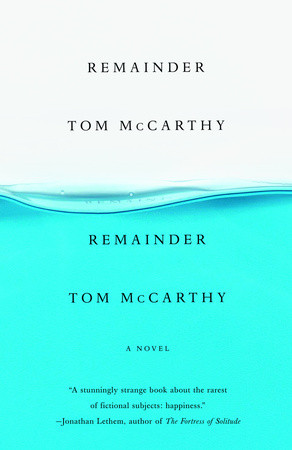It’s rare to find a novel that both demands philosophical reflection and is a genuinely fun read, but Tom McCarthy pulls off that balance perfectly in his refreshingly unorthodox debut. The plain weirdness of the story and its sparse, restless prose will be the first things to grab you, but it’s McCarthy’s thoughtful treatment of the no-man’s-land between artificiality and reality that will keep Remainder in your head long after you put it down.
After suffering a traumatic brain injury caused by an accident that he is legally prohibited from speaking about (and that he cannot remember), Remainder’s nameless narrator must relearn even the simplest of actions, leaving him with a stifling sense of his own inauthenticity. The £8.5 million settlement he receives does little to relieve his confusion. But when the sight of a uniquely shaped crack in a bathroom wall triggers a sudden memory, the narrator feels momentarily connected to reality in a way he thought he never would again.
Chasing this fleeting sensation of déjà vu, he puts his newfound wealth toward staging a series of increasingly involved “reenactments.” These reenactments range from mundane mimicry of daily life to dangerously vivid scenes of violence and murder. Participating in these staged events is the only way for him to act “fluently” and escape his sense that he is living several paces behind real life. The narrator soon grows addicted to the “intense and serene” tingling sensation he gets when reconstructing a memory. With his mental state deteriorating, his reenactments begin to spiral out of control. His final great reenactment irrevocably blurs the line between the theatrical and the actual, to disastrous effect.
Much as the narrator reenacts events, Remainder self-consciously reenacts the conventional understanding of a novel as a storytelling device. Early on, the narrator finds himself sitting in a coffee shop observing a group of homeless people. Struck by the idea that “these people, finally, were genuine,” he invites one of them to dinner. Soon the narrator’s observations of the scene start breaking down: white wine turns red, large breasts are suddenly small. Even the table disappears, because “there wasn’t any table. The truth is, I’ve been making all this up.” Up until this point, Remainder has been flirting with a handful of genres—romance, mystery, crime—but with the narrator’s admission of dishonesty, all pretenses of conventionality are dropped. McCarthy can finally give us the book he’s wanted to write all along: a clever and disconcerting portrait of an obsessive mind.
Despite the ever-present backdrop of trauma and existential confusion, Remainder is a surprisingly easy read, cleverly sucking you into its own warped world. A psychological roller coaster punctuated with moments of unexpected empathy, Remainder is an uncannily profound glimpse into one man’s fragmented perception of (un)reality—one that is all the more disturbing because you may just recognize something of yourself in his dysfunctional mind. After all, as Remainder’s narrator knows all too well, “minds are versatile and wiley things.”
Emma Volk is a summer intern at Touchstone, an imprint of Simon & Schuster.










